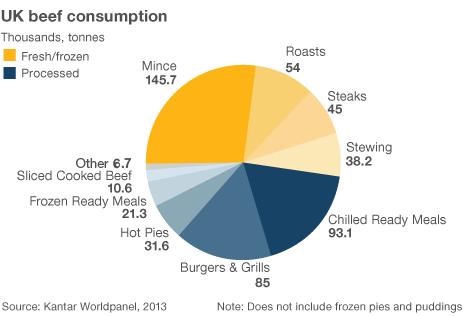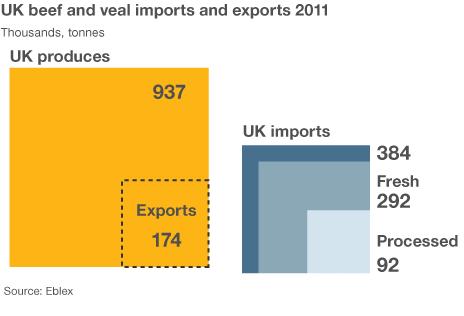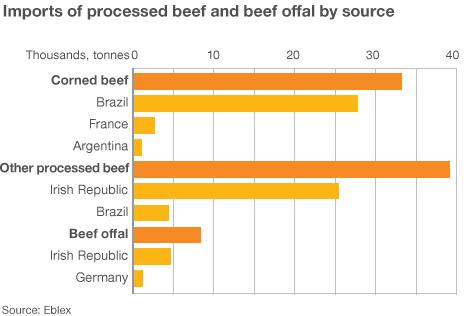Horsemeat scandal: Don't dump meat, says food minister
- Published
- comments
Owen Paterson tells the BBC he would eat withdrawn meat products because "they pose no threat to human health"
People should not throw away frozen meat products in the wake of further revelations in the horsemeat scandal, the food minister has said.
David Heath advised consumers to carry on eating meat unless told otherwise.
The Food Standards Agency has asked UK firms to test all processed beef foods, but said it did not "suspect there is any health issue with frozen food".
Environment Secretary Owen Paterson is to hold a summit with heads of meat retailers and suppliers on Saturday.
Food Minister Mr Heath said the government's advice was "exactly that" of the FSA's.
"The FSA says there is no reason to suppose there is a health risk and therefore the advice is to carry on with normal shopping habits until you are told otherwise," he told the BBC.
But shadow environment secretary Mary Creagh has expressed fears that other contaminated foods may be found.
'Criminal activity'
Supermarket chain Aldi said tests on its Today's Special Frozen Beef Lasagne and Today's Special Frozen Spaghetti Bolognese showed they contained between 30% and 100% horsemeat. These products had already been withdrawn after a warning from French supplier Comigel.
An Aldi spokesman said: "This is completely unacceptable and like other affected companies, we feel angry and let down.... If the label says beef, our customers expect it to be beef."
Findus UK became caught up in the row this week after horsemeat was found in its lasagne.
A third-party French supplier alerted Findus on Monday to concerns the beef lasagne product did not "conform to specification".
The FSA said Findus had tested the meat in 18 of its beef lasagne products and found 11 meals in which it contained between 60% and 100% horsemeat. Findus has withdrawn the meals. Comigel said it had withdrawn all products related to its own supplier.
The FSA said it was "highly likely" criminal activity was to blame for the contamination.
Mr Paterson said: "Clearly there are some people who believe they can get away with selling cheap meat and passing it off as something else. Our investigations will find them and they will feel the full force of the law."
In other related developments:
The body representing school caterers in the UK says it is "as certain as anyone could be" that that horsemeat products have not been used in schools
Prime Minister David Cameron describes the latest revelations as "very shocking" and "completely unacceptable"
Ms Creagh says she has contacted police to pass on information concerning UK companies who are potentially involved in the illegal horsemeat trade
The GMB union says all hospitals, schools and meals-on-wheels services should verify that horsemeat has not been served to vulnerable people
The Ministry of Agriculture in France says it is investigating the possibility of criminal fraud in relation to horsemeat found in ready meals
Trading standards and environmental health bodies say their officers across the UK are on "high alert"
Findus says it is "sorry that we have let people down", in a fresh statement, external. It has also withdrawn several ready-meals from supermarkets in France and Sweden.
Retail analysts warn the latest disclosures could be "disastrous" for the meat processing industry
FSA chief executive Catherine Brown told the BBC: "We are demanding that food businesses conduct authenticity tests on all beef products, such as beefburgers, meatballs and lasagne, and provide the results to the FSA."
The FSA's website, external advises consumers: "There is no reason to suspect that there's any health issue with frozen food in general, and we wouldn't advise people to stop eating it."

Between fresh and processed, the UK consumes more fresh or frozen beef.

The UK still produces and consumes more of its own beef than it imports

Ireland and Brazil are major suppliers of the UK's imported processed beef
Peter Kendall, president of the National Farmers' Union, said farmers who had suffered from food scares in the past were "furious" over the horsemeat revelations because they had already "raised their game".
He urged consumers to buy British meat to be sure of what they are eating.
Findus is the latest company to be caught up in the controversy surrounding contamination of meat products, which has affected firms in the UK, Irish Republic, Poland and France.
Last month, Irish food inspectors announced they had found horsemeat in some burgers stocked by a number of UK supermarket chains, including Tesco, Iceland and Lidl.
Ms Creagh expressed fears there were further revelations to come from the food industry.
"What we have had over the last four weeks is a constant drip, drip, drip of revelations from the food industry, from the Food Standards Agency, and what I am worried about is that the more they are testing for horse, the more they are finding," Ms Creagh said.
She suggested further guidance was needed on whether people should eat other processed foods labelled as containing beef.
Mr Heath said the FSA was undertaking the "biggest testing of beef products that has ever taken place" in order to offer reassurance.
A statement from the British Meat Processors Association (BMPA) said it "deplores the latest reported incidents of gross contamination of some processed meat products".
It urged members to review their raw material and ingredients-sourcing procedures.
- Published8 February 2013
- Published19 January 2013
- Published10 April 2013
- Published8 February 2013
- Published8 February 2013
- Published8 February 2013
- Published6 February 2013
- Published6 February 2013
- Published18 January 2013